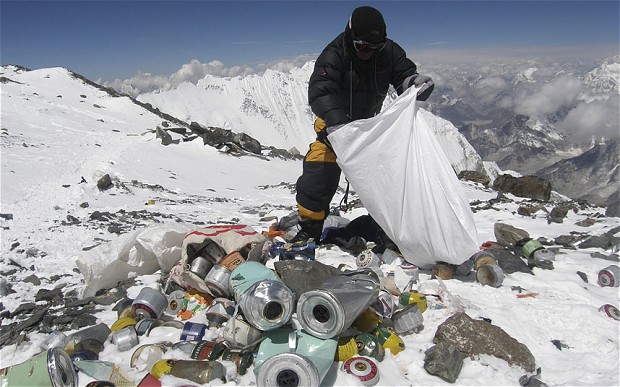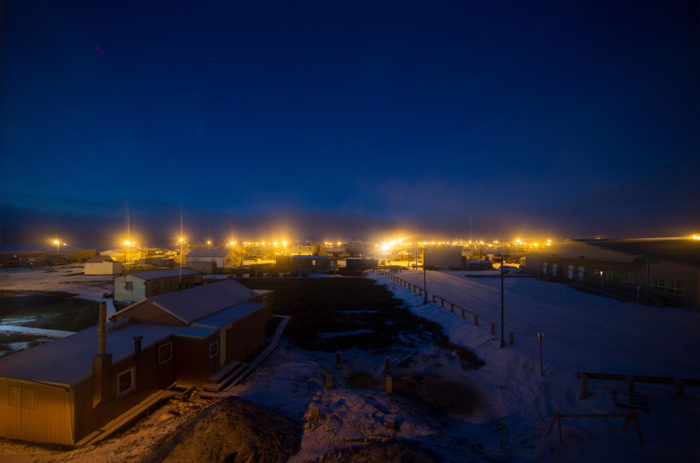Australian plea to knitters to make pullovers to aid oil-smeared penguins
An Australian penguin conservation group has put the call out to knitters across the world to make pullovers to help penguins recover from oil spills.

The Penguin Foundation says the jumpers help the creatures to keep warm and prevent them from trying to wipe the oil off with their beaks.
“It is a continuing problem,” said Lyn Blom, a regular penguin knitter who lives on the island.
“If somebody puts oil into the sea … a little penguin swimming along pops up to the surface and finds out he has come up in a circle of yukky stuff.
He loses all of his waterproofness. He gets very very cold… Normally he has a little insulating doona inside his feathers.”
The foundation, based at Phillip Island, an island with a large penguin colony about 90 miles from Melbourne, says the pullovers are easy to knit because penguins are so small.
“They’re very quick [to knit],” said Ms Blom, a receptionist at Phillip Island Nature Parks, told ABC News.
“Little penguins are only about 30 centimetres [12 inches] tall.”
The foundation distributes the pullovers to other wildlife centres and uses about 20 a year for its own oil-smeared penguins. The knitwear is worn until the penguins are deemed fit and sufficiently hydrated by local rangers, who then discard the dirty pullovers.
“Nobody wants a jumper with oil all over it,” Ms Blom said. “That oil is pretty yucky.”
Ms Blom said she had knitted between 200 and 300 penguin jumpers over the years in various patterns, including the uniforms of each of the Australian Rules football teams.
The program began after a large oil spill near the island in 2001.
High court to examine facial hair, teeth-whitening
Facial hair and teeth-whitening will be getting unusually prominent attention from the Supreme Court.
 The court agreed Monday to hear two cases during its next term that involve matters of personal hygiene in vastly different settings.
The court agreed Monday to hear two cases during its next term that involve matters of personal hygiene in vastly different settings.
In one case, the court will decide whether an Arkansas prison inmate must be allowed to grow a short beard in accordance with his religious beliefs. The justices will hear an appeal from inmate Gregory Holt, who says his Muslim beliefs require him to grow a beard.
State corrections officials say their grooming policy prohibiting beards promotes hygiene and safety. The court previously blocked the state from forcing Holt to shave the beard while the appeal was under consideration.
The 38-year-old Holt is serving a life sentence for domestic violence and burglary. Prosecutors alleged that Holt cut his girlfriend’s throat and stabbed her in the chest at her mobile home.
 Holt’s initial petition to the court was handwritten and filed without the benefit of an attorney, but he has since been represented by a lawyer.
Holt’s initial petition to the court was handwritten and filed without the benefit of an attorney, but he has since been represented by a lawyer.
Separately, the high court is taking up a North Carolina case in which the state’s dental regulatory board argues that only dentists should be allowed to whiten teeth. The state Board of Dental Examiners is challenging a lower court ruling and an order by the Federal Trade Commission that said the board engaged in unfair competition in the market for teeth-whitening services by shutting down businesses such as day spas and tanning booths that offered the service.
The board sued the FTC in 2011, saying the agency overstepped its authority. But the federal appeals court in Richmond, Va., sided with the FTC.
One appeals court judge said the board would have had a stronger case if its members were elected or appointed by state government officials rather than by other dentists.
Both cases will be argued in the fall.
Nepal orders Everest climbers to bring rubbish down with them or face fine
Climbers hoping to scale Mount Everest will have to tidy up behind them and return with their own rubbish under new rules introduced by Nepal to stop the world’s highest peak becoming a high altitude waste dump.

A Nepalese sherpa collecting garbage, left by climbers, at an altitude of 8,000 metres during the Everest clean-up expedition (Photo: AFP/Getty)
Groups which fail to return to base camp with either eight kilogrammes (17.6 lbs) of rubbish for each team member will lose their $4,000 deposit (£2,397). The Nepali government is to open inspection offices at the Everest base camp to weigh each climbers litter and waste following their descent.
Tourism officials said the government had acted to enforce its rules as the numbers climbing on the mountain and summiting the peak continues to increase with more and more waste being left on its slopes.
More than 4000 have now scaled the summit since Sir Edmund Hilary conquered it with Sherpa Tenzing in 1953, but the summiteers club is becoming steadily less exclusive with the Nepal government reducing fees and offering discounts to groups.
Next year the fees will be more than halved from $25,000 to $11,000 (£6,600) each. Last year Everest earned £2 million in climbing fees alone and generates millions more by attracting tourists desperate for a glimpse.
The advent of luxury Everest expeditions, which assist inexperienced, wealthier climbers to achieve a lifetime’s ambition have been blamed for some of the increased litter and rising tensions between groups and the Sherpas who guide them to the peak. Last year those tensions erupted when a mob of 100 Sherpas attacked three experienced Alpinists, including Briton Jonathan Griffith, following a row over priority on the slopes.
Officials said they do not know how much litter and human waste remains on the slopes of Everest but it is estimated at hundreds of tons, including several hundred bodies of climbers who died attempting the summit or on its perilous descent.
The Eco Everest Expedition which takes a team to the peak every season to clear the waste and retrieve the frozen bodies – since 2008 its climbers have removed 13.5 tons of rubbish and five bodies. In May 2012, four of members of their group were killed in the worst single loss on Everest since 2004 when one member was killed in an avalanche and three others thrown to their deaths by heavy winds.
Now the Nepal government has joined their campaign by enforcing rules which will inspect the waste brought back from the slopes by each climber.
Dipendra Paude, spokesman for Nepal’s tourism ministry, told the Telegraph groups will lose their deposit if they return to its base station office without at least eight kilogrammes of rubbish or a good explanation for their failure. “They should bring back all their garbage, even if it is nine or ten kilogrammes. If they don’t we will inspect the first and second camps. Everest is getting more and more rubbish every day. We will see the implementation after this season,” he said.
From London’s Daily Telegraph and The Salt Lake Tribune



